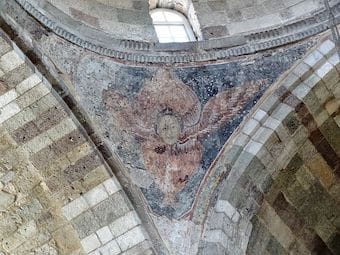1081
Anglo-Saxon poet Cynewulf paints a word-picture of heaven and the seraph-band that swoops and soars before the throne.
Cynewulf (possibly the 8th century bishop Cynewulf of Lindisfarne) lets his raptures flow on the Seraphim, the angels described by Isaiah, Ezekiel and St John the Divine; the singing angels, who surround the throne of God in heaven.
Picture: © Olaf Tausch, Wikimedia Commons. Licence: CC BY-SA 4.0.. Source.
Posted July 22 2017
1082
As a last, desperate throw of the dice in the Great War, the Germans detonated an unusual kind of weapon in St Petersburg.
At the height of the Great War, beleaguered Britain’s trusty ally Tsar Nicholas II of Russia was forced from his throne. Would the new Russian Government support the Allies? Some were naive enough to think so, but as Winston Churchill explained, the Germans had yet another deadly weapon in their arsenal.
Picture: From ‘Lenin’ (1930), by F.A. Ossendowsky, via Wikimedia Commons. Licence: Public domain.. Source.
Posted July 21 2017
1083
Don Pedro’s brother John tries to ensure that the course of true love does not run smooth.
‘Much Ado About Nothing’ is William Shakespeare’s enduring comedy of love, imposture and high society, written in 1598 or the following year. The topsy-turvy plot (of which what follows can only be a glimpse) is full of gossipy wit, but it deals with a serious subject: a lady’s reputation.
Picture: © Alexander Hoernigk, Wikimedia Commons. Licence: CC BY-SA 4.0.. Source.
Posted July 20 2017
1084
St Bede says that Christ’s Transfiguration should remind us that we live in two worlds at the same time.
One day, Jesus took three of his closest disciples up a mountain, and there briefly revealed himself to them as he truly is. For St Bede, the 8th century Northumbrian monk, it was a reminder that the light of heaven comes to those whose hearts are in heaven.
Picture: By Nikolay Koshelev (1840-1918), via Wikimedia Commons. Licence: Public domain. Source.
Posted July 17 2017
1085
Henry VII must decide how to deal with a boy calling himself ‘King Edward VI’.
Ever since 1455, the Royal dynasties of Lancaster and York had been vying for the crown in the ‘Wars of the Roses’. Then in 1485, Welsh outsider Henry Tudor (Lancaster) defeated King Richard III (York) at Bosworth near Leicester, and set himself to draw a line under thirty years of strife.
Picture: © Christine Matthews, Geograph. Licence: CC BY-SA 2.0.. Source.
Posted July 16 2017
1086
Sir Walter Scott warned that schoolchildren must not expect to be entertained all the time.
The hero of Walter Scott’s historical novel Waverley, published in 1814, is Edward Waverley, a delicate child plucked from London’s fogs and taken to his father’s country estate for his health. There, the boy was allowed to direct his own education. He had curiosity, which was good, but no staying power; and Scott took a moment to reflect on how fashionable educational theory was not much help in this regard.
Picture: Bodleian Collections, via Wikimedia Commons. Licence: Public domain.. Source.
Posted July 14 2017





